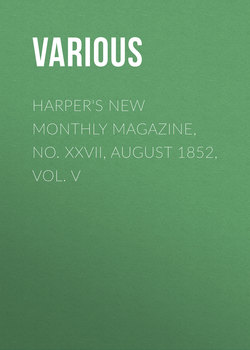Читать книгу Harper's New Monthly Magazine, No. XXVII, August 1852, Vol. V - Various - Страница 20
MEMOIRS OF THE HOLY LAND
THE MONK ST. BASIL
ОглавлениеThe Carmelites themselves were accustomed to maintain that the earliest written rule for the government of their order was given them by a very celebrated ancient monk, known in history as St. Basil. St. Basil lived about three hundred years after the time of Christ. He was descended from a distinguished family, and received an excellent education in early life, in the course of which he made very high attainments in all the branches of knowledge customarily pursued in those days. His mind, however, being strongly impressed with a sense of religious obligation, he determined not to engage in the duties of the profession for which he had been trained, but to seclude himself from the world, in accordance with the custom that prevailed in those days, and spend his life in religious meditation and prayer. As a preliminary step he determined on taking a journey into the countries where the practice of religious retirement had begun to prevail, in order to visit the hermits, recluses, and monks, in their dens and caves, and become practically acquainted with the mode of life which these voluntary exiles from the world were accustomed to lead. He accordingly set out upon his travels, and in the course of a few years he explored Egypt, Palestine, Syria, Asia Minor, and other countries still farther east, in order to visit and converse with all the monks and hermits that he could find, in the deserts and solitudes to which they had retired. We can not here give the subsequent particulars of his life. It is sufficient to say that his learning, his high rank, his exalted character, and perhaps his honest and conscientious piety, combined to raise him in the end to a very commanding position in respect to the whole monastic world while he lived, and to inspire many succeeding generations with a great veneration for his memory. He was believed to have been during his life an object of the special and miraculous protection of heaven; for it is recorded as sober historic truth, that at one time, during the latter part of his career, when certain theological enemies had prevailed in obtaining a sentence of banishment against him, and the decree, properly drawn up, was brought to the emperor to sign, the pen which was put into the emperor's hand broke suddenly into pieces as soon as it touched the paper. The emperor called for another pen, but on attempting to use it the same result followed. This was done three times, and at last, as the emperor seemed determined to persist in his design, his hand was seized with a sudden and uncontrollable trembling, and the chair upon which he was sitting broke down, and let him fall upon the floor. The emperor now perceived that he was contending against God, and taking up the decree he destroyed it by tearing it in pieces.
Now the Carmelites maintained that this St. Basil was a monk of their order, that he was one of the successors of Elijah, that they had obtained their first written rule of their order from him, and that the Basilians, an order of monks taking their name from him and well known throughout Europe in the middle ages, were to be considered as only a branch, or offshoot, from the ancient Carmelite institution. Out of this state of things there arose subsequently a very extraordinary controversy between the Basilians and the Carmelites as will presently appear.
